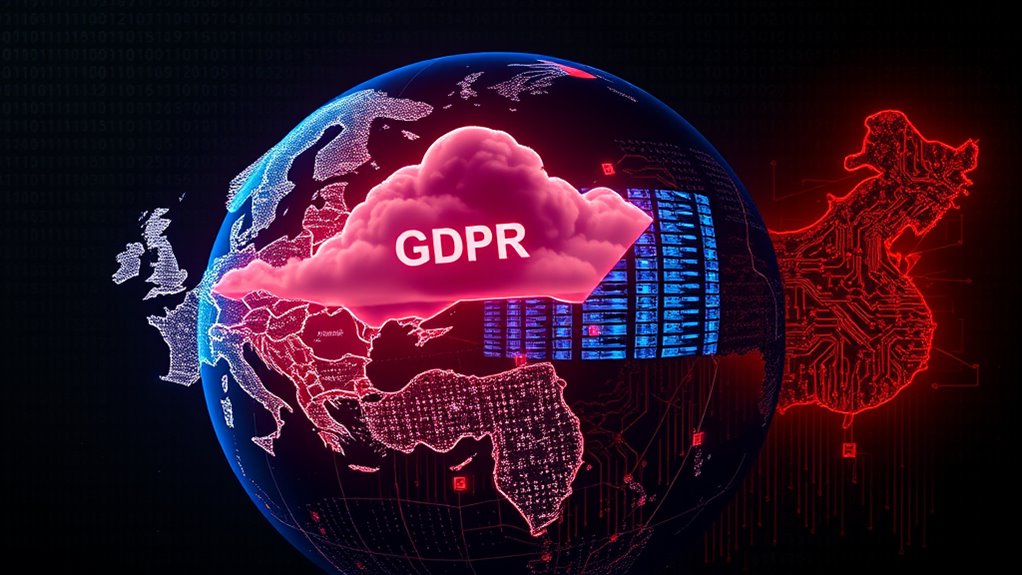The geopolitics of data privacy show a clear clash of priorities. GDPR emphasizes strict control over personal data and sovereignty within the EU, affecting global companies handling EU citizens’ info. Meanwhile, the U.S. favors free data flows to promote innovation, with lighter regulations like CCPA and HIPAA. China enforces strict local data laws to maintain national security and control over digital space. Exploring these different approaches reveals how countries balance privacy, sovereignty, and economic interests—there’s much more to uncover.
Key Takeaways
- GDPR emphasizes data sovereignty and privacy rights within the EU, with extraterritorial scope affecting global companies processing EU data.
- U.S. cloud policies prioritize free data flow and innovation, with sector-specific laws and minimal restrictions on cross-border data movement.
- China enforces strict data localization and security laws to control digital infrastructure and safeguard national sovereignty.
- Divergent policies create fragmentation, complicating international data governance and impacting cross-border business operations.
- The geopolitical landscape reflects competing priorities: privacy and sovereignty versus free data flow and economic growth.

Have you ever wondered how data privacy has become a key battleground in global politics? It’s because nations are increasingly recognizing that control over data isn’t just about privacy—it’s about power, influence, and sovereignty. Countries are implementing different approaches to regulate data flows across borders, which sparks debates about cross border regulations and sovereignty concerns. These issues directly impact how data can move freely, how companies operate internationally, and how governments protect their citizens’ information. When data crosses borders, it becomes a question of jurisdiction—who has the authority to access, govern, and enforce laws on that data? This is where sovereignty concerns come into play, as nations want to maintain control over their digital space, just as they do with physical borders. The European Union’s General Data Protection Regulation (GDPR) exemplifies a strict approach, emphasizing data sovereignty and giving individuals significant control over their data. GDPR’s cross border regulations require companies outside the EU to comply if they handle data of EU citizens, effectively extraterritorial in scope. This means that even if a company operates outside Europe, it must adhere to GDPR if it processes data from EU residents. Such regulations highlight a country’s desire to assert sovereignty over digital data and ensure its citizens’ privacy rights are protected, regardless of where the data is stored or transmitted. Moreover, the importance of data sovereignty influences ongoing international negotiations and the development of new treaties aimed at harmonizing cross-border data governance frameworks. These differing policies and regulations underscore the importance of establishing clear digital sovereignty standards to prevent conflicts and promote cooperation between nations.
Conversely, the United States advocates for a more business-friendly approach, emphasizing innovation and free data flow. While the U.S. has sector-specific laws like HIPAA and CCPA, it generally favors lighter regulations, which can lead to conflicts with stricter frameworks like GDPR. U.S. companies often find themselves caught in the middle—trying to comply with various regulations across jurisdictions while maintaining operational efficiency. This tug-of-war sparks tension around cross border regulations: should data be free to flow across borders for economic growth, or should countries impose restrictions to safeguard sovereignty and privacy? China’s data laws introduce another layer to this debate. The Chinese government enforces strict regulations that give it tight control over data, especially data generated within its borders. These laws often prioritize national security and sovereignty concerns over free data movement, requiring foreign companies to store data locally and cooperate with government requests. This approach reflects China’s desire to maintain sovereignty and control over its digital infrastructure, often leading to increased fragmentation in global data flows.
In this complex landscape, you’re caught in a web of competing priorities—privacy, innovation, sovereignty, and economic interests—all driven by how governments view their digital sovereignty. As countries adopt diverse policies and enforce cross border regulations differently, navigating this geopolitical terrain becomes more challenging for individuals and businesses alike. The battle over data privacy isn’t just about protecting personal information; it’s about asserting control in a digital age where borders are increasingly blurred.
Frequently Asked Questions
How Do International Data Laws Impact Global Tech Companies?
International data laws directly impact your global tech operations by requiring cross border compliance, meaning you must adapt to diverse regulations across countries. You need to prioritize data sovereignty, ensuring data remains within legal boundaries. These laws can increase complexity, cost, and operational risks, but they also protect user privacy and build trust. Staying compliant helps you avoid penalties and enables smoother international expansion, making your company more resilient in a competitive global market.
What Are the Economic Consequences of Data Sovereignty Policies?
You see, data sovereignty policies shape the digital economy by creating sovereignty conflicts that can disrupt international trade and innovation. When countries impose strict data localization laws, you might face higher costs and limited access to global markets. These policies can slow down technological progress, increase compliance burdens, and fragment the digital landscape, ultimately affecting economic growth and competitiveness on a global scale.
How Does Data Localization Influence Cross-Border Data Flow?
They say “a chain is only as strong as its weakest link,” and data localization highlights this. By enforcing data sovereignty, countries impose cross-border restrictions, making it harder for data to flow freely. These policies aim to protect national interests but can hinder global business operations and innovation. You’ll find that data localization often results in increased costs and delays, ultimately shaping how organizations manage and transfer data internationally.
What Role Do International Organizations Play in Data Privacy Regulation?
International organizations play a key role in shaping data privacy regulation through cross-border treaties and privacy alliances. You rely on these agreements to coordinate standards, promote cooperation, and guarantee data flows securely across borders. They help bridge gaps between different legal frameworks, making it easier for you to navigate complex regulations and protect user privacy while maintaining seamless international data exchange.
How Are Emerging Technologies Shaping Future Data Governance?
You might think emerging technologies like AI threaten data privacy, but they also promote better data stewardship and ethical AI practices. These innovations shape future data governance by enabling smarter, more transparent policies. As you adapt, understanding AI ethics becomes vital to balance innovation with privacy rights. Embracing these technologies responsibly ensures you stay compliant and protect user data, ultimately building trust and fostering sustainable digital growth.
Conclusion
Think of data privacy as a global dance, where every country steps to its own tune. GDPR, U.S. cloud laws, and China’s data rules each set a different rhythm, shaping how data moves across borders. As you navigate this complex choreography, remember that understanding these moves helps you stay in sync with the world’s data landscape. Ultimately, staying informed is your best dance partner in this evolving geopolitical stage.









